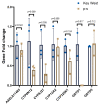Permethrin Resistance in Aedes aegypti Affects Aspects of Vectorial Capacity
- PMID: 33466960
- PMCID: PMC7830706
- DOI: 10.3390/insects12010071
Permethrin Resistance in Aedes aegypti Affects Aspects of Vectorial Capacity
Abstract
Aedes aegypti, as one of the vectors transmitting several arboviruses, is the main target in mosquito control programs. Permethrin is used to control mosquitoes and Aedes aegypti get exposed due to its overuse and are now resistant. The increasing percentage of permethrin resistant Aedes aegypti has become an important issue around the world and the potential influence on vectorial capacity needs to be studied. Here we selected a permethrin resistant (p-s) Aedes aegypti population from a wild Florida population and confirmed the resistance ratio to its parental population. We used allele-specific PCR genotyping of the V1016I and F1534C sites in the sodium channel gene to map mutations responsible for the resistance. Two important factors, survival rate and vector competence, that impact vectorial capacity were checked. Results indicated the p-s population had 20 times more resistance to permethrin based on LD50 compared to the parental population. In the genotyping study, the p-s population had more homozygous mutations in both mutant sites of the sodium channel gene. The p-s adults survived longer and had a higher dissemination rate for dengue virus than the parental population. These results suggest that highly permethrin resistant Aedes aegypti populations might affect the vectorial capacity, moreover, resistance increased the survival time and vector competence, which should be of concern in areas where permethrin is applied.
Keywords: Aedes aegypti; kdr; permethrin resistance; survival time; vector competence; vectorial capacity.
Conflict of interest statement
The authors declare no conflict of interest.
Figures

Similar articles
-
Co-occurrence of kdr Mutations V1016I and F1534C and Its Association With Phenotypic Resistance to Pyrethroids in Aedes aegypti (Diptera: Culicidae) Populations From Costa Rica.J Med Entomol. 2020 May 4;57(3):830-836. doi: 10.1093/jme/tjz241. J Med Entomol. 2020. PMID: 31891404
-
Quantification of permethrin resistance and kdr alleles in Florida strains of Aedes aegypti (L.) and Aedes albopictus (Skuse).PLoS Negl Trop Dis. 2018 Oct 24;12(10):e0006544. doi: 10.1371/journal.pntd.0006544. eCollection 2018 Oct. PLoS Negl Trop Dis. 2018. PMID: 30356237 Free PMC article.
-
Pyrethroid-resistance and presence of two knockdown resistance (kdr) mutations, F1534C and a novel mutation T1520I, in Indian Aedes aegypti.PLoS Negl Trop Dis. 2015 Jan 8;9(1):e3332. doi: 10.1371/journal.pntd.0003332. eCollection 2015 Jan. PLoS Negl Trop Dis. 2015. PMID: 25569164 Free PMC article.
-
Spatial distribution of insecticide resistant populations of Aedes aegypti and Ae. albopictus and first detection of V410L mutation in Ae. aegypti from Cameroon.Infect Dis Poverty. 2022 Aug 17;11(1):90. doi: 10.1186/s40249-022-01013-8. Infect Dis Poverty. 2022. PMID: 35974351 Free PMC article.
-
Co-occurrence of V1016I and F1534C mutations in the voltage-gated sodium channel and resistance to pyrethroids in Aedes aegypti (L.) from the Colombian Caribbean region.Pest Manag Sci. 2019 Jun;75(6):1681-1688. doi: 10.1002/ps.5287. Epub 2019 Jan 16. Pest Manag Sci. 2019. PMID: 30520256
Cited by
-
Knockdown resistance allele L1014F introduced by CRISPR/Cas9 is not associated with altered vector competence of Anopheles gambiae for o'nyong nyong virus.PLoS One. 2023 Aug 10;18(8):e0288994. doi: 10.1371/journal.pone.0288994. eCollection 2023. PLoS One. 2023. PMID: 37561739 Free PMC article.
-
Immune-related transcripts, microbiota and vector competence differ in dengue-2 virus-infected geographically distinct Aedes aegypti populations.Parasit Vectors. 2023 May 19;16(1):166. doi: 10.1186/s13071-023-05784-3. Parasit Vectors. 2023. PMID: 37208697 Free PMC article.
-
The buzz in the field: the interaction between viruses, mosquitoes, and metabolism.Front Cell Infect Microbiol. 2023 Apr 26;13:1128577. doi: 10.3389/fcimb.2023.1128577. eCollection 2023. Front Cell Infect Microbiol. 2023. PMID: 37360524 Free PMC article. Review.
-
Vector competence of lambda-cyhalothrin resistant Aedes aegypti strains for dengue-2, Zika and chikungunya viruses in Colombia.PLoS One. 2022 Oct 25;17(10):e0276493. doi: 10.1371/journal.pone.0276493. eCollection 2022. PLoS One. 2022. PMID: 36282839 Free PMC article.
-
Assessing the Impact of Insecticide Resistance on Vector Competence: A Review.Insects. 2022 Apr 12;13(4):377. doi: 10.3390/insects13040377. Insects. 2022. PMID: 35447819 Free PMC article. Review.
References
-
- Cuervo-Parra J.A., Cortés T.R., Ramirez-Lepe M. Insecticides Resistance. IntechOpen; Rijeka, Croatia: 2016. Mosquito-Borne Diseases, Pesticides Used for Mosquito Control, and Development of Resistance to Insecticides; pp. 111–134.
-
- Vontas J., Kioulos E., Pavlidi N., Morou E., Della Torre A., Ranson H. Insecticide resistance in the major dengue vectors Aedes albopictus and Aedes aegypti. Pestic Biochem. Physiol. 2012;104:126–131. doi: 10.1016/j.pestbp.2012.05.008. - DOI
-
- Bayo F.S. Insecticides Mode of Action in Relation to Their Toxicity to Non-Target Organisms. J. Environ. Anal. Toxicol. 2012;2012:1–9.
Grants and funding
LinkOut - more resources
Full Text Sources
Other Literature Sources

